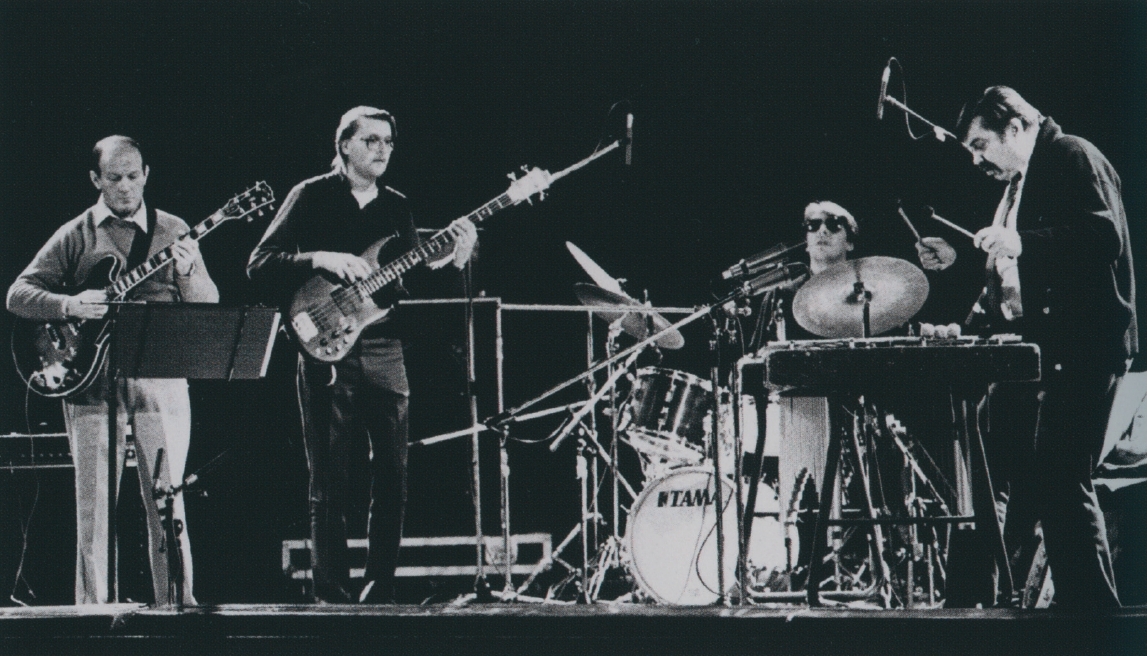Yugoslav Jazz: Essential Albums
Introduction to Yugoslav Jazz
When people think of Yugoslav music, jazz is rarely the first thing that comes to mind. The region is most often remembered for its Novi Val (new wave) explosion in the early 1980s, with bands like Šarlo Akrobata, Azra, EKV, and Haustor, or for its enduring pop-rock and singer-songwriters. Yet beneath the surface, a rich jazz culture quietly flourished.
From the 1960s onward, musicians like Duško Gojković and Boško Petrović began blending American jazz traditions with Balkan folk idioms, creating a distinct regional sound. Each of the major cities — Belgrade, Zagreb, Ljubljana, and Skopje — had thriving jazz ensembles and orchestras, leaving behind recordings that today feel both pioneering and timeless.
By the 1970s, a powerful jazz-rock movement emerged, led by groups like Time, September, and Leb i Sol. In the 1980s, Ljubljana’s underground became a hub of avant-garde jazz fusion, with bands like Begnagrad and Miladojka Youneed pushing boundaries few dared to approach. Meanwhile, jazz-funk and disco seeped into the mainstream, producing cult records by artists like KIM and Zdenka Kovačiček.
The result is a body of work that may not have reached the same global audience as Yugoslav rock, but stands today as one of the most adventurous chapters in Balkan music history. Here are 10 essential albums that capture the diversity and innovation of Yugoslav jazz.
10 Essential Yugoslav Jazz Albums
Swinging Macedonia – Duško Gojković (1967)
Few names loom as large in the Yugoslav jazz landscape as Duško Gojković. A Serbian trumpeter, composer, and arranger born in Jajce (now Bosnia and Herzegovina), Gojković studied at the Belgrade Music Academy before moving abroad — first to Germany, then to the U.S. He would go on to perform with legends like Miles Davis, Chet Baker, Sonny Rollins, and Stan Getz. Alongside vibraphonist Boško Petrović, he’s considered one of the most important jazz figures to emerge from former Yugoslavia.
Released in 1967, Swinging Macedonia is believed to be Gojković’s first LP as a bandleader. Recorded in Cologne and produced by Eckart Rahn, it’s a pioneering piece of Balkan jazz fusion, rich with original compositions that pull heavily from Macedonian folk idioms while rooted firmly in post-bop and cool jazz. The international sextet lineup is impressive: Eddie Busnello (saxophone), Nathan Davis (saxophone/flute), Peter Trunk (bass), Cees See (drums), and the great Mal Waldron (piano).
This album follows shortly after the Zagreb Jazz Quartet’s With Pain I Was Born (1966) — another milestone in Balkan jazz that spotlights Boško Petrović’s masterful vibraphone. Taken together, these releases highlight the quiet yet explosive creativity that emerged in the Yugoslav jazz world during the 1960s.
With Pain I Was Born – Zagreb Jazz Quartet (1966)
Another one of the earliest landmarks in Balkan jazz, this record showcases vibraphonist Boško Petrović at his peak. The quartet blends cool jazz textures with Croatian folk motifs, balancing sophistication with lyricism. Miljenko Prohaska’s bass lines and Petrović’s shimmering vibraphone make it a graceful, deeply atmospheric listen.
After Hours – Duško Gojković (1971)
Recorded after his time with some of the biggest names in American jazz, After Hours finds Gojković in a more intimate, nocturnal mood. The sextet delivers laid-back post-bop with subtle Balkan undertones. It’s an album that rewards repeated late-night listening and cemented his reputation as a master bandleader.
Leb i Sol – Leb i Sol (1978)
In 1978, four young musicians from Skopje stepped onto the Yugoslav scene and offered something unlike anything else of the time. Calling themselves Leb i Sol — literally “bread and salt,” a phrase symbolising a traditional Macedonian welcome — the band carried that same sense of warmth into their music, inviting listeners into an entirely new sound world, one where Balkan folk tradition fused seamlessly with jazz-rock and fusion experimentation. At a time when Yugoslav rock was dominated by stadium-ready bands like Bijelo Dugme, this felt like something unconventional.
The lineup was stacked with talent: legendary guitarist Vlatko Stefanovski, bassist Bodan Arsovski, keyboardist Nikola Kokan Dimuševski, and drummer Garabet Tavitjan.
From the opening track, Devetka, you hear the band’s identity loud and clear. Built on a 9/8 folk rhythm, it’s hypnotic and soothing, almost cinematic in scope. Just when you think you know where it’s going, synths creep in and tilt the song into spacier, prog-like territory. That tension between tradition and 70s experimentation runs through the whole record.
Zadnja Avantura – September (1976)
September’s Zadnja Avantura bears the face of Ljubljana’s jazz-rock underground; it’s the scene’s calling card: a fiery, stylish fusion and endlessly groovy. Formed in 1975, September was a supergroup of sorts: organist Tihomir Pop Asanović, vocalist Janez Bončina, and jazz trumpeter Petar Ugrin. Each brought serious pedigree — Asanović played in the Croatian band Time and also had a successful jazz-funk solo album, Majko Zemljo (which you can read my review of here), and Ugrin had been a member of Mladi Levi and the RTV Ljubljana Jazz Orchestra.
Samo Muzika – Petar Ugrin (1979)
Trumpeter and violinist Petar Ugrin was a versatile force in the Yugoslav scene, and Samo Muzika highlights that breadth. Fusing jazz, funk, and electronic textures, the album moves effortlessly from soulful trumpet passages to psychedelic violin experiments. Drummer Ratko Divjak’s grooves give it irresistible momentum, making it a hidden gem of late-‘70s fusion.
Begnagrad – Begnagrad (1982)
The early ’80s gave rise to political uncertainty and the rise of Novi Val (new wave/post-punk) and postmodern experimentation. Artists like Begnagrad and Srp began to break form — fusing jazz with satire, folk, theatre, and free improvisation. Their work was often off-kilter, even absurd, blending influences from Frank Zappa, Rock in Opposition, and regional folklore. If you enjoy free jazz and the more experimental side, check out Miladojka Youneed’s 1987 release, Ghastly Beyond Belief. Warning: it is as ghastly as it sounds.
Ne, Zaista Žurim – KIM Band (1981)
Jazz-funk/disco record led by Macedonian trombone player Kire Mitrev, featuring ex-Korni Grupa drummer Vladimir Furduj and a variety of female vocalists. It’s full of funky rhythms, catchy vocals, and groovy basslines.
Plesni Orkestar Radio-televizije Zagreb – Plesni Orkestar Radio-televizije Zagreb (1977)
The Zagreb Dance Orchestra was one of the premier big bands in Yugoslavia, and this LP captures their polish and swing. Each track is arranged by a different band member, showing the ensemble’s range — from lush ballads to brassy, uptempo pieces. It’s a time capsule of the professional jazz sound coming out of Croatia in the late ‘70s.
Jazz Orkestar Radio-Televizije Beograd – Jazz Orkestar Radio-Televizije Beograd (1978)
Belgrade’s Radio-Television Jazz Orchestra offered a grittier, more energetic counterpart to Zagreb’s smoother arrangements. This release brims with brass power and sharp improvisations, reflecting the vibrancy of the Belgrade jazz scene. It’s essential for anyone interested in how Yugoslavia institutionalized jazz through its public orchestras.
Listen to our Curated Playlists
Ready to listen? These playlists are updated regularly with new finds, fan favourites, and deep cuts.
- Ex-YU 101: Starter Pack
- Post-Punk & Novi Val Essentials
- Coastal Sounds: Split, Rijeka & Dalmatia
- Modern Ex-YU Rock (2000–Now)
- Ex-YU Jazz-Rock: Ljubljana
Explore More
Consider engaging with these external lists, documentaries, and books to explore the scene further:
- Excavating Slovenia’s Rock In Opposition – Article from It’s Psychedelic Baby! on the RIO (Rock In Opposition) movement in the ’80s
- Sretno Dijete – Rockumentary featuring the emergence of Yugoslav punk and new-wave
- Ex-YU Rock Encyclopedia – Book featuring information regarding most of the important rock and music acts from the time
- Seventh Republic – pop culture in the collapse of Yugoslavia – A journey through Ex-YU music, politics and history
Stay Connected!
- Subscribe to our newsletter to stay updated – it’s free!
- Instagram: @exyumusic.yu
- TikTok: @exyumusic.org
- Spotify: @exyumusic
- Contact us at: [email protected]

